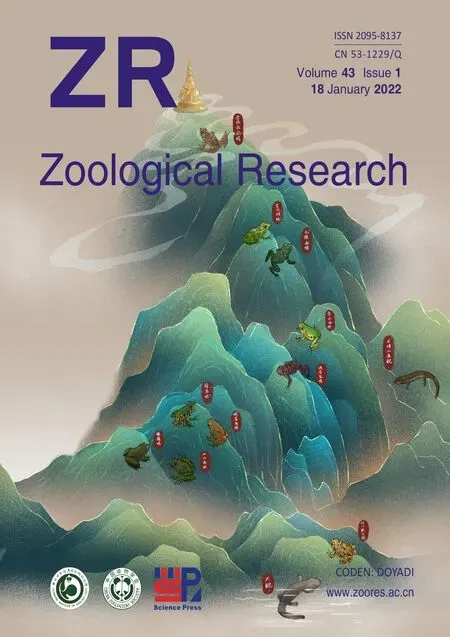Zoological Research shines in the East
With the long-term support of every friend and contributor,Zoological Research (ZR) has continued to move forward over the past year, with impressive achievements.Notably, ZR attained an impact factor of 4.56 (JCR Q1) and CiteScore of 4.6 in mid-2021, thus ranking in the top five of the 175 SCI journals within the Zoology category.In November 2021, our Citescore reached 5.6, and we expect a higher impact factor in 2022 than in 2021.Although we are not driven by chasing these scores, the increase in these metrics does reflect an elevation in the quality of submissions and publications, as well as the march towards our original aspiration when launching this journal (Yao et al., 2019).The current areas of focus of ZR (i.e., primate and animal models; animal diversity and evolution; conservation & utilization of animal resources)are not only tightly connected to our host – the Kunming Institute of Zoology, which has grown and evolved into “a comprehensive research institution renowned for its remarkable achievements in evolutionary mechanisms of animal biodiversity, animal resources protection, and sustainable utilization” (Yao & Shen, 2019) – but also represent the very frontiers of zoology.
Globally, 2020 and 2021 were tough years due to the continuing COVID-19 pandemic.However, with dedicated and focused research from submitting authors, ZR published a variety of important and timely studies over the past two years on a broad range of topics.Several studies on COVID-19,e.g., Yu et al.(2020) and Gómez-Carballa et al.(2020),received wide attention in the field and were scored as Hot Papers according to the Web of Science in June 2021.Similarly, another five ZR papers (Li et al., 2020; Tang et al.,2020; Wang et al., 2017; Xu et al., 2020; Yu et al., 2020) were featured as Highly Cited Papers by the Web of Science during the same season.ZR also published other high-profile papers in 2021.For instance, Li et al.(2021) performed a phylogenetic and morphological investigation of an overlooked flying squirrel species (Pteromyini, Rodentia) from the eastern Himalayas and described a new genus; Boubli et al.(2021)resolved a taxonomic conundrum of pygmy marmosets using ancient DNA of the type specimen; and Ye et al.(2021)provided an updated annotation of the Chinese tree shrew genome based on large-scale RNA sequencing and long-read isoform sequencing, which will surely become an essential reference for basic and biomedical studies using tree shrews.To list all the important studies published in ZR in 2021 is obviously beyond the scope of this editorial.However, we are proud of our growing reputation among the authors of these papers and their remarkable advances in important research,with many citations in well-regarded journals, such as Nature,Nature Communications, National Science Review, Advanced Science, PNAS, Biological Psychiatry, Molecular Psychiatry,Medicinal Research Reviews, Nature Cell Biology, Cell Research, Molecular Cell, and Nucleic Acids Research.
Excitingly, in 2021, Prof.Le Kang and Prof.Nina Jablonski were elected as international and national members,respectively, of the National Academy of Sciences of the United States.We remain greatly honored to have them as editorial board members of ZR and extend our warmest congratulations to both these outstanding scientists.In addition, to further foster the impact of ZR and strengthen our publishing team, ZR has recruited young and capable researchers to expand our dynamic editorial board.From the beginning of 2022, with continuous support from senior editorial board members, we are honored to welcome a new group of talented and academically diverse members to ZR.While new editors have a more flexible one-year term than senior editorial board members (four-year term), their term can be renewed based on their willingness, devotion, and performance.We believe this new strategy will help younger scientists establish their own academic careers and will help enhance the vitality and creativity of ZR.
When we look back at the evolution of ZR over the past four decades (Yao & Jiang, 2021), we have certainly encountered many challenges, including the initial dip in readership during the conversion from a Chinese to English-only language publication seven years ago, as well as solo publishing without help from renowned platforms such as Springer-Nature, Wiley Press, and Cell Press.Despite these difficulties, ZR has not stopped its march ahead and remains a shining beacon in the East.ZR has always garnered strong support from our many readers and authors.To better serve our contributors, as well as society in general, our growing capacity is not only reflected by the increase in publication quantity, but more importantly, by the academic quality of each paper.ZR always welcomes hot topics within the scope of the journal.If youwish to publish extraordinary research or serve as a guest editor for a special column/issue, please be free to contact us or the Editorial Office.
Finally, but most importantly, we would like to express our deepest appreciation to every ZR supporter.Your interest in ZR is the fuel with which we continue to move forward.We are always proud to publish your research, and we believe that ZR will continue to shine in the East with your enduring faith and support.

Yong-Gang Yao, Editor-in-Chief Kunming Institute of Zoology, Chinese Academy of Sciences, Kunming, Yunnan 650223, China

Yun Zhang, Executive Editor-in-Chief Kunming Institute of Zoology, Chinese Academy of Sciences, Kunming Yunnan 650223, China
- Zoological Research的其它文章
- Cenozoic Tethyan changes dominated Eurasian animal evolution and diversity patterns
- Genome-wide association study identifies quantitative trait loci affecting cattle temperament
- Opah (Lampris megalopsis) genome sheds light on the evolution of aquatic endothermy
- Comparative mitogenomic analyses unveil conserved and variable mitogenomic features and phylogeny of Chedrinae fish
- A new species of the gudgeon genus Huigobio Fang,1938 (Cypriniformes: Cyprinidae) from the Yangtze River Basin, southern China
- Multidimensional amphibian diversity and community structure along a 2 600 m elevational gradient on the eastern margin of the Qinghai-Tibetan Plateau

